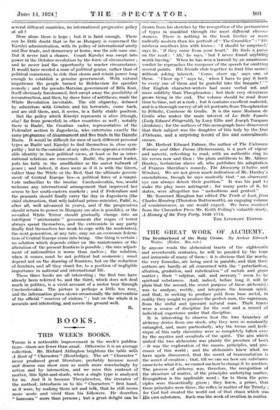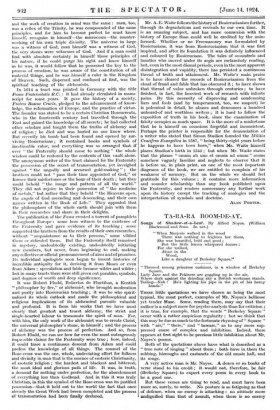THE GREAT WORK OP ALPITEM,Y;
The Brotherhood of the Rosy Cross. By Arthar pdviLusl Waite. (Rider. 30s. net.)
IF anyone reads the alchemical tracts of the eighteenth and seventeenth centuries, he will be puzzled by the tone and innuendo of many of them : it is obvious that vcip,w9rci:J, the very formulae, are being used in parable, and tbi4.their authors. are hardly at all concerned with the putrefactio,a, albation, gradation, and ruhefication " of metals and„ grass matter ; their "sulphur, salt, and mercury," seem to be spiritual substances. And, indeed, before long it will„.lie plain that the second, the secret . purpose of these alchemist.; was to analyze, rectify, and integrate the human. spirit, and that, in seeking to produce gold from base nuetak in reality they sought to produce the perfect Man, the fitipencLan, from the sinful and ignorant natural man. Their. traets were a course of discipline for the soul and- a ,re.eon.1
individual experience under that discipline.. .
it is interesting to observe how the two liraachea , alchemy derive from one stock, why they were so .constAmtly entangled, and, more particularly, why the terms ,and,.;tecti- nique of this early chemistry were so completely taken. oyer by the mystics and occultists of the .spirit. The aim which united the two alchemists was plainly the province of both —it was the exploration of the causes, principles,, and ;pro- cesses of this world ; and the alchemists knew what we have again discovered, that the secret of transmutation .i; the secret of creation ; that, till we can see how, one subutanee came to be what it is, we cannot see how to change it to another. The process of alchemy was, therefore, the recognition of the structure of matter, of the principles underlying matter. Recognition is the applicable word ; for to them the prin- ciples were theoretically given ; they knew, a priori, that these principles were three, the reflex in matter of the Trinity, ; for God had created the world out of that chaos which was His own substance. -Such was the work of creation in matter and the work of creation in mind was the same : man, too, was a reflex of the Trinity, he was compounded of the same principles, and for lain to become perfect he must know himself, recognize in himself—the . microcosm—the counter- working of his own triple divinity. The universe in large was a witness of God, man himself was a witness of God, the very stones were witnesses of God. And if a man could find -with absolute certainty in himself those principles of his nature, if he could purge his sight and know himself as he was, it would follow that he possessed the key to the process of creation, he was aware of the constitution of all material things, and he was himself a ruler in the Kingdom of Heaven. Such, dispersed and confused at first, was the spiritual teaching of the alchemists.
In 1614 a tract was printed in Germany with the title Fame Fraternitatis R.C. : it had already circulated in manu- script for some years. It gave the history of a society, Fratres Roseae Crucis, pledged to the advancement of know- ledge, the reformation of Europe, and the practice of virtue. The founder was stated to be a certain Christian Rosencreutz, who in the fourteenth century had travelled through the East and gained the knowledge of all secrets ; he had collected other scholars and taught them the truths of alchemy and of religion ; he died and was buried no one knew where. But recently his tomb had been found and opened by sur- viving Rosierucians ; it contained books and symbols of inestimable value, and everything was so arranged that if ever "the Fraternity should come to nothing" the whole wisdom could be restored by the contents of this vault alone. The anonymous writer of the tract claimed for the Fraternity the possession of the secret of transmutation, yet inveighed against "the ungodly and accursed gold-making " ; the brothers could not "pass their time appointed of God," or foresee their misfortunes or the hour of their death ; but they could behold "the image and pattern of all the world." They did not rejoice in their possession of "the medicine of metals," but rather that they beheld "the Heavens open, the angels of God ascending and descending, and their own names written in the Book of Life." They appealed that the philosophers of the whole earth should join with them in their researches and share in their delights.
The publication of the Fama created a torrent of pamphlets throughout Europe : some bore witness to the existence of the Fraternity and gave evidence of its teaching ; some supported the brothers from the results of their own researches, without "acquaintance as to their persons," some vilified them or ridiculed them. But the Fraternity itself, remained in mystery, undoubtedly existing, undoubtedly initiating new members, but never, from beginning to end, making any collective or official pronouncement of aims and of promises. Its individual apologists soon began to invent histories of incredible antiquity for it, deriving it from Moses or even from Adam ; speculation and fable became wilder and wilder ; but in many tracts there were still given out parables, symbols, and dogmas of worth and deep significance.
It was Robert Fludd, Robertus de Fluctibus, a Kentish "philosopher by fire," or alchemist, who brought moderation and purity into Rosicrucian teaching ; it was he who spirit- ualized its whole outlook and made the philosophical and religious implieations of its alchemical pursuits valuable and profound. It is from his works that we have most clearly that greatest and truest alchemy, the strict and single-hearted labour to transmute the spirit of man. For, with him, the only work of the alchemist was to create Christ, the universal philosopher's stone, in himself ; and the process of alchemy was the process of perfection. And so, from Robert Fludd, we can see how far even the most outrageously imioisible claims for the Fraternity were true; how, indeed, it could trace a continuous descent from Adam and could profess the knowledge of all things. The counsel of the Rose-cross was the one, whole, undeviating effort for fullness and divinity in man that is the essence of esoteric Christianity, of esoteric religion ; the hardest and blackest and bitterest, the most ideal and glorious path of life. It was, in truth, a demand for nothing under perfection, for. the abandonment
• of everything, less than Godhead. And in this it was truly Christian, in this the symbol of the Rose-cross was its justified possession—that it held out to the world the fact that once already the Great Work had beeen completed and the process of transmutation had been finally declared.
Mr. A. E. Waite follows the history of Rosicrucianism further, through its degradations and revivals to our own time. It is an amazing subject, and has more connexion with the history of Europe than could well be credited by the unin- formed. Whether or no Freemasonry was formulated by Rosicrucians, it was from Rosicrucianism that it was first inspired, and after its foundation it was definitely influenced and coloured by Rosicrucians. The tales of scoundrels and lunatics who moved under its aegis are melancholy reading, but, even in the most dismal periods, even in the most apparent disintegration and vapidity, there has persisted a continuous thread of truth and attainment. Mr. Waite's main praise is to have cleared the records of Rosicrucianism from the cloud of fraud and fable that has obscured it ; to have shown that thread of value unbroken through centuries ; to have finished, in fact, the heaviest work of research with infinite pains. By this necessity of disproving and condemning liars and fools (and by temperament, too, we suspect) he is polemical in detail, he abuses and denounces a hundred unheard-of and worthless writers ; it is hard to follow the exposition of truth in his book, since the examination of falsity occupies so much space. It is the more of a misfortune that he is himself on occasions forgetful and inconsistent. Perhaps the printer is responsible for the denunciation of a writer who stated that Simon Studion founded the Militia Crucifera .Evangelica in 1587, "being thirty-eight years before he happens to have been born," when Mr. Waite himself places Studion's birth in 1543; but when Mr. Waite states that the phrase " omnia ab uno et onmia ad unum " seems somehow vaguely familiar and neglects to observe that it is before us, in plain print, on one of the most important diagrams of the book, we are entitled to complain of his weakness of memory. But on the whole we should feel gratitude for this volume ; it contains more information and sounder scholarship than any book published upon the Fraternity, and renders unnecessary any further work upon its history except the tracking of analogies and the interpretation of symbols and doctrine.
ALAN PORTER.











































 Previous page
Previous page